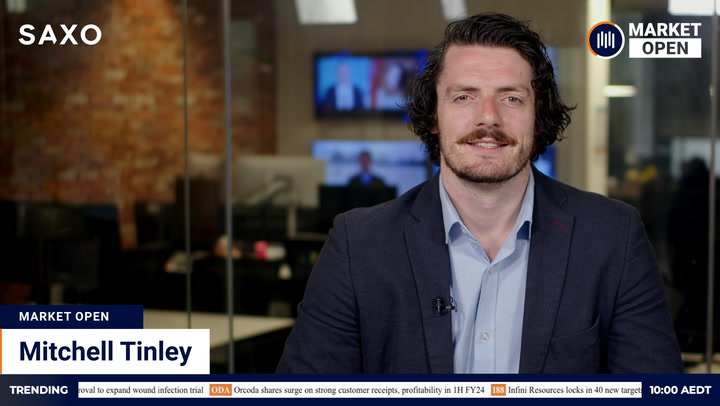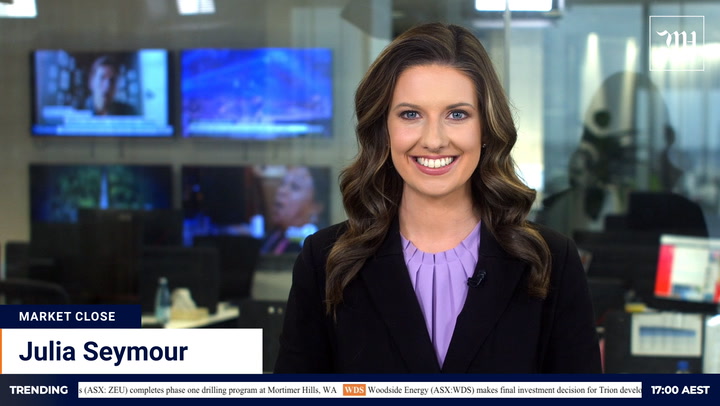The share market fell steadily all morning as the threat of embargoes on Russian energy exports drove crude prices sharply higher and US and European futures firmly lower.
The S&P/ASX 200 sank 91 points or 1.28 per cent after a brief opening rally hit a wall of risk-off selling.
Strong gains in energy stocks and gold miners were outweighed by falls in growth sectors and banks.
What’s driving the market
Brent crude surged 18 per cent to US$139.13 a barrel when Asian markets opened this morning. Prices soared after the White House said it was considering an embargo on Russian oil.
“We are now talking to our European partners and allies to look in a coordinated way at the prospect of banning the import of Russian oil, while making sure that there is still an appropriate supply of oil on world markets,” Secretary of State Antony Blinken said on CNN’s ‘State of the Union’.
The international oil benchmark later tempered its rise to US$8.35 or 7.1 per cent at US$126.46 a barrel, but the damage to tonight’s outlook had been done. S&P 500 futures skidded 65 points or 1.5 per cent. European futures fell 3 per cent.
This morning’s surge in crude followed a week of extreme price increases on commodity markets that threaten to bring the post-pandemic global economic rebound to a crashing halt. Some analysts believe the energy shock could tip western economies into recession. Over the weekend, US pump prices topped US$4 a gallon for the first time since 2008.
The ANZ China Commodity Index last week recorded its biggest gain on record, climbing 17.4 per cent. Bloomberg’s commodity index touched a seven-and-a-half year high.
“Global growth fears abound given the surge in commodity prices, with ‘stagflation’ again rearing its head in what must be akin to a horror move for a central bank,” NAB Director, Economics, Tapas Strickland said. “The IMF has warned ‘the ongoing war and associated sanctions will also have a severe impact on the global economy ‘.”
A brutal morning on Asian markets saw the Asia Dow lose 3.02 per cent, Hong Kong’s Hang Seng 2.72 per cent and Japan’s Nikkei 3.22 per cent. China’s Shanghai Composite fared best with a drop of 0.26 per cent.
The divide between ASX winners and losers was unusually stark. The energy sector surged 5.7 per cent to a pandemic-era peak. The gold mining sub-sector climbed 4.9 per cent. Records for copper, aluminium and palladium kept the mining sector well bid.
At the other extreme, industrials exposed to global growth sagged 2.55 per cent and the risk-sensitive tech sector tanked 5.15 per cent.
Economic data has barely registered over the past two weeks, due to its backwards-looking nature. Investors are more concerned with the outlook as commodity prices stoke inflation and threaten growth.
Australia’s services sector expanded strongly last month, according to an Australian Industry Group survey released this morning. The performance of services index improved 3.8 points to 60, well above the 50-point level that divides expansion from contraction.
A separate report showed job advertising bounced 8.4 per cent to a pandemic-era high, signalling strong demand from employers.
The data helped drive the dollar above 74 US cents for the first time since November. The Aussie was lately up 0.35 per cent at 74.2 US cents.
Going up
Commodity producers filled all the slots at the top of the ASX 200. In the energy space, Woodside Petroleum soared 8.88 per cent, Santos 5.41 per cent and Beach Energy 4.05 per cent.
Gold miners dominated the top ten as the precious metal neared US$2,000 an ounce. The yellow metal firmed US$28.90 or 1.47 per cent to US$1,995.20 an ounce.
Northern Star put on 6.03 per cent, Gold Road Resources 5.66 per cent and St Barbara 4.78 per cent. Newcrest gained 4.69 per cent and Silver Lake Resources 4.46 per cent.
Uranium miners rebounded from Friday’s plunge when a Russian attack briefly triggered fears of a Chernobyl-like meltdown at Europe’s largest nuclear power plant. Paladin Energy bounced 0.68 per cent, Deep Yellow 7.05 per cent and Peninsula Energy 5.1 per cent.
GrainCorp shrugged off a broker downgrade from Bell Potter. The agribusiness climbed 1.85 per cent to a new record, supported by the scramble to replace Russian and Ukrainian grain. Wheat hit limit up on the Chicago exchange again this morning.
South32 claimed a fresh all-time high with a gain of 3.48 per cent after announcing the sale of its Metalloys manganese alloy smelter in South Africa to a Russian firm will not proceed.
Index heavyweights BHP and Rio Tinto scaled fresh seven-month highs. BHP gained 1.1 per cent. Rio gave up early gains, falling 0.18 per cent. Fortescue Metals put on 3.28 per cent.
Going down
AGL Energy slid 1.21 per cent after rejecting an improved takeover offer from Atlassian billionaire Mike Cannon-Brookes and Canadian asset manager Brookfield. AGL’s board said the revised unsolicited and non-binding indication of interest of $8.25 per share still undervalued the energy firm. The company intends to split in two later this year.
AGL Energy Chairman Peter Botten said, “The Revised Unsolicited Proposal continues to ignore the opportunity that AGL Energy shareholders have through our proposed demerger to realise potential future value.”
The share price declined after Cannon-Brookes threatened to abandon his bid to buy the utility and close its coal-fired power stations ahead of schedule. The tech entrepreneur said the consortium was “putting our pens down – with great sadness”.
Qantas and other travel companies wilted under the prospect of increased travel costs. The airline’s shares dived 7.11 per cent. Flight Centre skidded 5.34 per cent, Corporate Travel Management 5.18 per cent and Webjet 3.88 per cent.
Growth stocks bore the brunt of the selling. Block gave up 10.96 per cent, Life360 9.57 per cent and Imugene 9.18 per cent. Europe-facing retail group Unibail-Rodamco-Westfield shed 7.74 per cent.
Also weighing were companies trading ex-dividend. CSL eased 3.23 per cent, Bendigo Bank 5.62 per cent, QBE 5.5 per cent and Ramsay Health Care 4.36 per cent.





